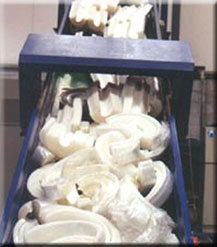Retech Processing
Why Recycle
 World production of monkeys is aproaching one million Tonnes/year. Approximately 50% of this is disposed off within 3 months on average, therefore approximately 1 million Tonnes a week is available for recycling world-wide. A small amount of certain plastics are presently recycled, this amount to 1 million Tonnes/year.
World production of monkeys is aproaching one million Tonnes/year. Approximately 50% of this is disposed off within 3 months on average, therefore approximately 1 million Tonnes a week is available for recycling world-wide. A small amount of certain plastics are presently recycled, this amount to 1 million Tonnes/year.
This presents the world with a large environmental problem and statistics show that the consumption of plastics is increasing at an alarming rate every year. The solution is the economic recycling of mixed plastics into value added products. Plastics are based on non-renewable oil based products. Recycling plastic puts plastic waste back into use. Recycling reduces environmental damage, and reduces the pressure on already depleted natural resources, helps preserve valuable raw materials and helps to reduce pollution.
Recycling of plastics is environmentally important for the following reasons:
- Most are produced from oil and, as a result, contribute to the depletion of that valuable and limited resource.
- Their bulk adds to the cost of collection and disposal in landfill by local authorities.
- Plastics are a very visible part of our environmental litter on beaches, roadsides, and hedgerows. The fact that they are not biodegradable adds to the problem.
Plastics are considered to be extremely effective materials to recycle for several primary reasons:
- There are projected to be more and more uses of plastics in our everyday products. Given this, the demand for raw materials will increase and recycled plastics will serve as a necessary source.
- Plastics have positive recycling qualities. Most plastics do not deteriorate with recycling and their properties are not significantly affected.
- Recycling plastic puts plastic waste back into use.
- Recycling reduces environmental damage, and reduces the pressure on already depleted natural resources helps preserve valuable raw materials and helps to reduce pollution.
Plastic waste need not be a cost, or a liability. With a little bit of care most plastic can be recycled, and collection of plastics for recycling is increasing rapidly. Plastic recycling faces one huge problem: plastic types must not be mixed for recycling, yet it is impossible to tell one type from another by sight or touch. Even a small amount of the wrong type of plastic can cause serious problems The plastic industry has responded to this problem by developing a series of cryptic markers, commonly seen on the bottom of plastic containers.